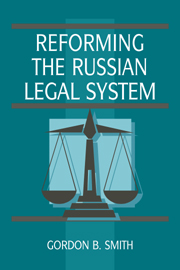Book contents
- Frontmatter
- Contents
- Preface
- 1 Pre-revolutionary Russian law
- 2 The Bolshevik experience
- 3 The history of legal reform
- 4 Forging a new constitution
- 5 Citizens and the state: the debate over the Procuracy
- 6 In search of a just system: the courts and judicial reform
- 7 Law and the transition to a market economy
- 8 Legal reform in the republics
- 9 Legal reform and the transition to democracy in Russia
- Appendix: Constitution of the Russian Federation
- Notes
- Index
7 - Law and the transition to a market economy
Published online by Cambridge University Press: 09 October 2009
- Frontmatter
- Contents
- Preface
- 1 Pre-revolutionary Russian law
- 2 The Bolshevik experience
- 3 The history of legal reform
- 4 Forging a new constitution
- 5 Citizens and the state: the debate over the Procuracy
- 6 In search of a just system: the courts and judicial reform
- 7 Law and the transition to a market economy
- 8 Legal reform in the republics
- 9 Legal reform and the transition to democracy in Russia
- Appendix: Constitution of the Russian Federation
- Notes
- Index
Summary
In terms of economic growth, the only thing worse than a society with a rigid, overcentralized, dishonest bureaucracy is one with a rigid, overcentralized honest bureaucracy.
Samuel P. Huntington, Professor of Government, HarvardSince the introduction of economic reforms under Gorbachev's policy of perestroika, law has played a major role in setting the course and pace of economic reform. Nevertheless, the legal framework for economic reforms in Russia today is far from being adequate. There exists a plethora of laws governing economic activities, but they are often inconsistent, conflicting, and overlapping and have emanated from many different authorities at various levels in the Russian Federation. Some substantial bodies of law and legal codes of the former USSR are still in force, even with the demise of the Soviet Union. Other areas of law – for example, commercial law and tax law – for all practical purposes do not exist and leave businesses and officials operating in a legal state of nature, bordering on anarchy. The conflicting and confusing legal situation in the Russian economy poses one of the most significant impediments to foreign investment and to the effective utilization of IMF and World Bank funds earmarked for stimulating privatization and economic reform. In this chapter we review the principal pieces of emerging Russian economic law and note the impediments that must be overcome in order for conversion of the economy to be successful.
- Type
- Chapter
- Information
- Reforming the Russian Legal System , pp. 159 - 190Publisher: Cambridge University PressPrint publication year: 1996



